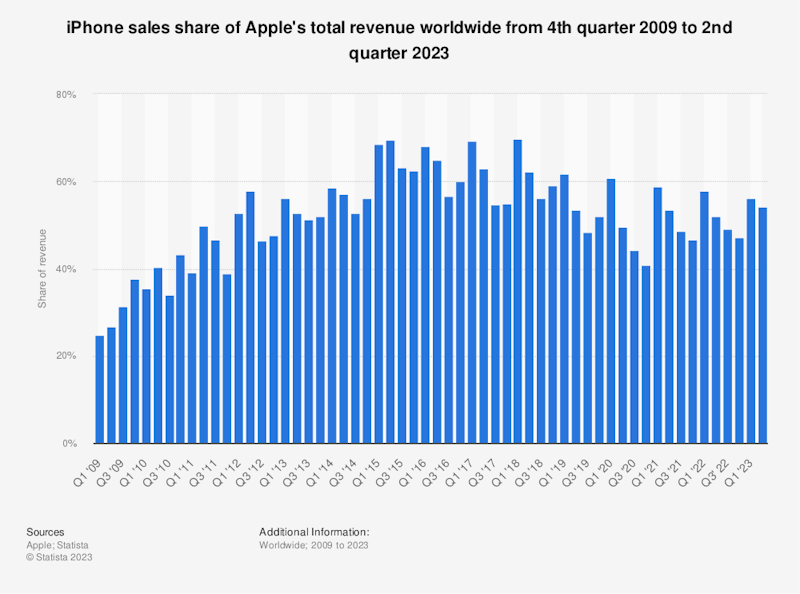In the News
Is Tesla doing to the motor industry what Apple did to Nokia?

6th August 2023
I'm not entirely sure that the parallels drawn by John Naughton between Apple/Nokia, Tesla and the motor industry are necessarily correct - however, this article does cover some interesting ground about the nature of innovation, the product life-cycle and the fact that it's often hard to spot inflection points like this.
Well worth a read: remember the iPhone is less than 20 years old and gone from being seen as a diverting novelty to near-ubiquity.
Please read: What Apple did to Nokia, Tesla is now doing to the motor industry (John Naughton)

What is the product life-cycle?
The product life cycle typically consists of four main stages:
- Introduction: This is the initial stage when a new product is introduced to the market. Sales are low, and the company usually incurs high costs due to heavy marketing and research and development efforts. Consumers are often not aware of the product yet, and the focus is on building awareness and gaining a foothold in the market. Example: The introduction of the first iPhone by Apple in 2007. The initial sales were relatively low as the product was new and not widely known, but it generated a lot of excitement and anticipation.
- Growth: In this stage, the product experiences rapid sales growth as consumer awareness increases and demand expands. Competitors may start entering the market, leading to increased competition. Companies often invest in improving the product and expanding distribution during this phase.Example: The iPhone's growth phase saw its sales and popularity skyrocket as more features were added, and Apple expanded its distribution to different countries and carriers.
- Maturity: During this stage, the product reaches its peak level of sales and market saturation. Competition is strong, and companies may focus more on differentiating their product through branding, promotions, or added features. Sales growth slows down, and profit margins may start to decline. Example: As the smartphone market matured, different brands released a wide range of models with various features and price points to appeal to different consumer segments. Sales growth became steadier, and companies focused on maintaining market share.
- Decline: Eventually, the product's sales start to decline due to changing consumer preferences, technological advancements, or the emergence of newer and better alternatives. Companies may choose to discontinue the product or reduce marketing efforts for it. Example: Basic flip phones saw a decline in sales as smartphones with advanced capabilities became more popular and accessible. Companies phased out these older models as they were no longer in demand.
It's important to note that not all products follow this exact life cycle pattern, and the duration of each stage can vary significantly based on factors such as market conditions, competition, technological advancements, and consumer behaviour.

How important is the iPhone to Apple as a business?
The iPhone is incredibly important to Apple as a business. It has been a cornerstone of Apple's revenue and profit generation for many years, playing a significant role in shaping the company's financial performance, brand image, and overall success. Here are some key reasons why the iPhone is crucial to Apple:
- Revenue and Profit Generation: The iPhone consistently accounts for a significant portion of Apple's total revenue and profits. The high price points of iPhones, along with the extensive ecosystem of services, apps, and accessories, contribute to strong financial performance. In some quarters, the iPhone has accounted for more than half of Apple's total revenue.
- Brand Identity: The iPhone has become synonymous with innovation, design excellence, and premium quality. Its success has helped build and maintain Apple's reputation for creating cutting-edge and desirable products.
- Ecosystem Lock-In: The iPhone serves as a gateway into Apple's broader ecosystem, including services like the App Store, iCloud, Apple Music, and more. Once users invest in the iPhone and associated services, they are more likely to stay within the Apple ecosystem, leading to additional revenue streams.
- Influence on Stock Performance: The iPhone's performance and sales projections have a direct impact on Apple's stock price and investor sentiment. Strong iPhone sales can drive positive market reactions, while weaker sales can lead to concerns among investors.
- Innovation and Differentiation: The iPhone's continuous evolution and improvements drive innovation and differentiation for Apple. It sets technological trends, pushes the boundaries of design, and often introduces features that other manufacturers later adopt.
- Competitive Landscape: The smartphone market is highly competitive, and the iPhone's success helps Apple maintain its position as one of the world's most valuable and influential technology companies.
- Customer Loyalty and Retention: A strong user base and high levels of customer satisfaction contribute to brand loyalty and customer retention. This, in turn, contributes to the likelihood of repeat purchases and ongoing engagement with Apple's ecosystem.
However, it's worth noting that while the iPhone remains pivotal, Apple has been diversifying its product and services portfolio in recent years to reduce its dependence on the iPhone. The company has expanded into areas such as wearables (Apple Watch, AirPods), services (Apple Music, Apple TV+, Apple Arcade), and more. This diversification strategy aims to mitigate potential risks associated with a decline in iPhone sales or shifts in consumer preferences.
In summary, the iPhone is undeniably crucial to Apple's business, driving revenue, profit, brand identity, and innovation. Its success has been instrumental in shaping Apple's position in the technology and consumer electronics markets.
You might also like

Tim Harford on Monopoly and Innovation
27th August 2014

New series of short films on Economics
29th July 2014

Footballs in Pakistan: An Innovation Story
30th May 2014

30 Most Innovative Countries in the World
24th January 2014

China at the Cutting Edge
19th September 2013

Innovation and Growth - the Entrepreneurial State
2nd September 2013
Patents
Study Notes
Innovation and Invention in Markets
Study Notes